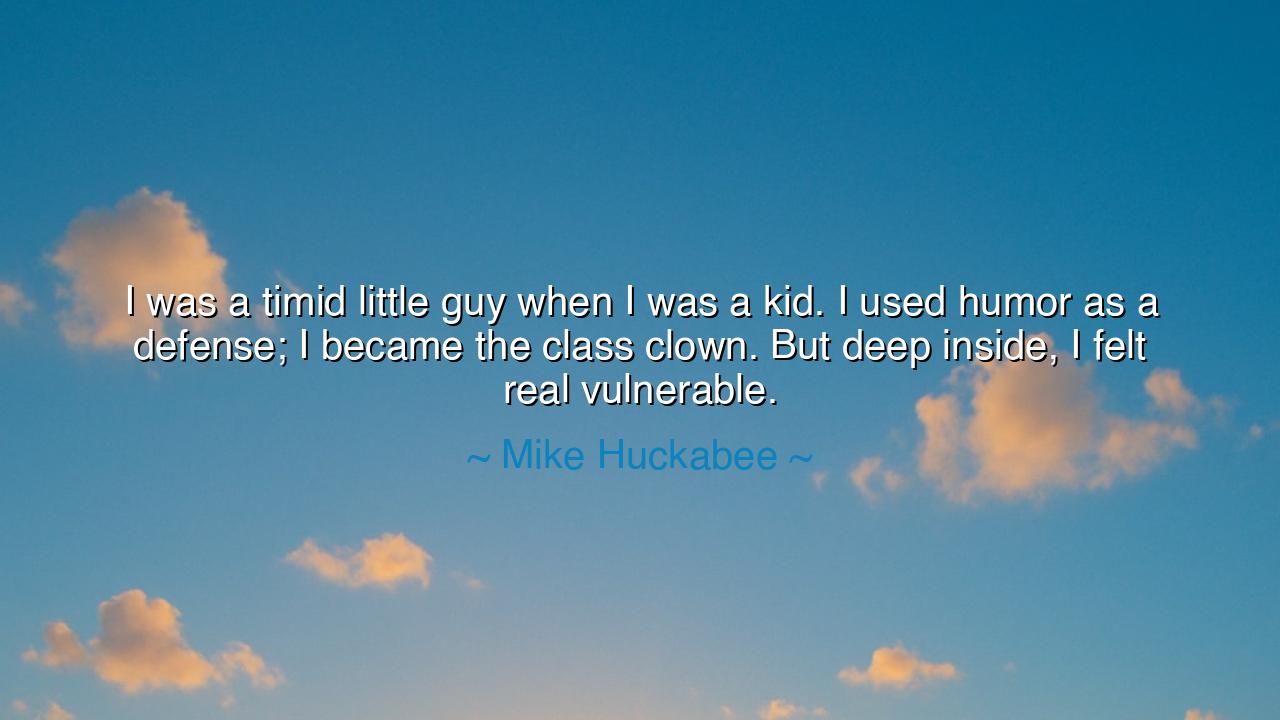
I was a timid little guy when I was a kid. I used humor as a
I was a timid little guy when I was a kid. I used humor as a defense; I became the class clown. But deep inside, I felt real vulnerable.






There are many masks that the human heart learns to wear, and among them, none is more deceptive — nor more tender — than the mask of laughter. When Mike Huckabee confessed, “I was a timid little guy when I was a kid. I used humor as a defense; I became the class clown. But deep inside, I felt real vulnerable,” he was speaking not only of his own childhood, but of a truth that echoes through all who have hidden their pain behind a smile. In his words we hear the quiet confession of the soul: that sometimes humor is not born from joy, but from fear; that the laughter that fills a room may conceal the trembling of a lonely heart.
The origin of this truth lies deep within the human spirit, for from the beginning of time, those who felt weakest have often learned to protect themselves through charm and wit. In the courts of kings, the jester was often the wisest of all — his jokes disguising his insight, his laughter shielding him from punishment. Likewise, the timid child, surrounded by louder voices or harsher worlds, learns to make laughter his armor. For the sound of laughter, even when it begins as a defense, brings momentary peace. It wins affection, eases conflict, and hides what feels unworthy of love. Yet, as Huckabee reveals, beneath the laughter lies vulnerability, that soft and sacred part of the self that longs not to perform, but to be seen.
To understand this more deeply, we must remember that humor is a double-edged gift. It can lift the spirit, heal wounds, and bridge divides — yet it can also serve as a veil, concealing what the heart is afraid to reveal. Many great comedians, philosophers, and artists have lived this paradox. Charlie Chaplin, the silent clown of the silver screen, made the world laugh even as his own life was shadowed by poverty, heartbreak, and exile. His comedy was not born from comfort, but from pain transformed. Like Huckabee, he used laughter as both shield and sword — to protect his tenderness, yet also to express it in a form the world could accept. Such souls remind us that those who make others laugh often carry the deepest understanding of sorrow.
Huckabee’s reflection reveals a kind of inner courage that deserves reverence. For the timid child who becomes the class clown is not simply seeking attention; he is seeking safety — a place where rejection cannot reach him, because he has already made himself the master of the joke. By turning vulnerability into laughter, he gains power over his fear, but at a cost: the world may laugh with him, yet never truly know him. The courage of such a child lies not only in his humor, but in the quiet endurance of feeling deeply in a world that seldom honors gentleness.
History, too, bears witness to this truth. Consider Abraham Lincoln, who, beneath his tall frame and rugged face, carried a heart haunted by melancholy. He was known for his wit and storytelling, often using humor to disarm enemies or to lighten the burdens of war. But those who knew him best saw the sadness behind his smile — the weight of loss, the ache of loneliness, the fear of failing those he led. Yet it was precisely this vulnerability that gave his humor its power. He laughed not to escape the world, but to bear it; not to hide his weakness, but to make it bearable for others. In that balance of sorrow and laughter lies the noblest kind of strength.
There is a lesson in this for all who wear masks to survive. To use humor as a defense is human — it is the heart’s way of protecting itself from cruelty. But one must remember that defenses, though useful, can become prisons. The laughter that guards us can also separate us from the intimacy we crave. The healing begins when we dare to let someone see the person behind the jokes — when we understand that vulnerability is not weakness, but the birthplace of authenticity. For only when the mask is lifted can the soul breathe freely and love without fear.
So, my child, take this wisdom to heart: do not hide your softness behind laughter forever. Let your humor be a bridge, not a wall; let it spring from joy, not from fear. There is no shame in vulnerability — it is the proof of life’s depth within you. Laugh, but do not forget to weep when the heart demands it. Speak bravely of your wounds, for in doing so, you will find others who carry the same scars. As Huckabee’s confession teaches us, the timid soul who learns to laugh may one day become strong — not because he silences his pain, but because he learns that laughter and vulnerability, together, are what make us most human.






AAdministratorAdministrator
Welcome, honored guests. Please leave a comment, we will respond soon